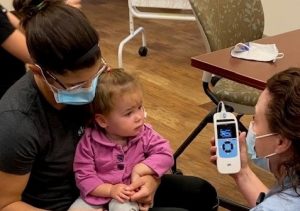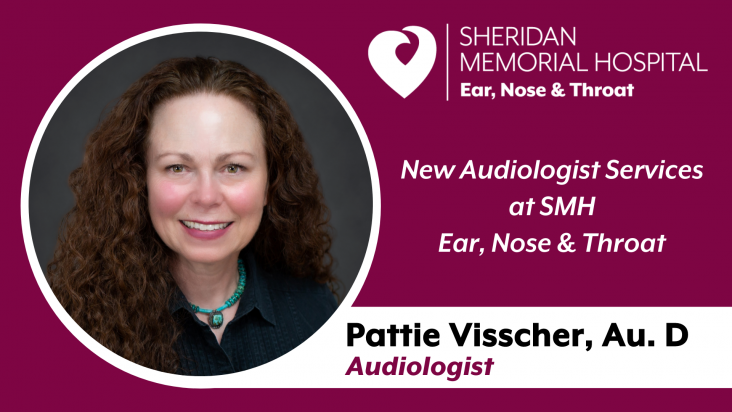By Pattie Visscher, Au.D., Audiologist
I’m excited to join the hospital staff as the new audiologist at Sheridan Memorial Hospital’s Ear, Nose and Throat (ENT) clinic. As an audiologist, I am a healthcare professional who can help prevent, diagnose and treat hearing and balance disorders in people of all ages. Audiologists help people improve their communication with others around them by offering those with listening difficulties increased access to auditory information via amplification options as well as communication and listening strategies.

I have been practicing audiology for more than 25 years, with an emphasis on pediatric care. I began my professional career at the Colorado School for the Deaf and the Blind in Colorado Springs. That experience gave me knowledge of Deaf culture, many types of amplification (traditional hearing aids, bone-anchored hearing aids, and cochlear implants), as well as the opportunity to become fluent in American Sign Language (ASL). My husband and I moved to Sheridan this summer and are so happy to be here.
I look forward to offering the Sheridan community comprehensive audiologic care. At our office, the focus for audiology is diagnostic testing, both to support Dr. Cheryl Varner, our otolaryngologist, and to work with patients directly to monitor hearing status and investigate the need for amplification, possibly with hearing aids. Our diagnostic services include complete hearing evaluations and a variety of testing techniques that specifically determine the status of the middle ear, inner ear and the auditory neural pathways.
Individuals with hearing loss commonly report feeling they misunderstand others or miss out on important conversations around them. They have trouble understanding others when in noisy environments such as restaurants. They have difficulty following dialogue on television programs, and many experience a ringing sound in one or both ears. Some people report a feeling of pressure or fullness in their ears and many report concerns with balance. Sometimes people suffer from dizziness or vertigo. Knowing and understanding your hearing status gives you the information you need to make informed decisions regarding your hearing.
Dr. Carol Flexer is a well-known professional in the field of audiology. She is famous for saying, “we hear with our brains,” calling our ears the “doorway” for sound to get to the brain. She emphasizes the sensory importance of the ears to deliver information to our brains so we can understand and organize auditory information. Good hearing is so important during childhood development in order for a child to hear and understand and know the difference between mom saying, “good morning” or “no, no, that’s hot, don’t touch.” Good hearing remains important throughout the lifespan. Much research has been devoted to examining the connection between cognitive decline and impaired hearing. Remaining engaged in communication keeps your brain active. Hearing impairment can lead to withdrawal from social interactions and decreased communicative interactions.
In today’s world, dealing with hearing loss while attempting to communicate with someone wearing a face covering or mask can be especially difficult. Many individuals wearing hearing aids have reported difficulty removing a mask without a hearing aid flying across the room. Shortly after mask mandates began, hearing aid manufacturers saw a spike in claims for hearing aid replacements or repairs due to loss or damage associated with wearing a mask and hearing aids. There are face covering styles that may work better for individuals with hearing aids, including masks that tie behind the head. Another option is the use of mask extenders that may reduce fatigue from pressure on your ears and redirect the mask ear loops.
YouTube has videos with suggestions regarding Face Masks and Hearing aids:
https://www.youtube.com/watch?v=wuPZAjhT_cQ
https://www.youtube.com/watch?v=FLP5CwiZn3I
Here are some hearing-related statistics from the NIDCD (National Institute on Deafness and Other Communication Disorders) that demonstrate how prevalent hearing concerns are in the United States:
- Approximately 15% of American adults (37.5 million) aged 18 and over report some trouble hearing.
- Roughly 10% of the U.S. adult population, or about 25 million Americans, has experienced tinnitus lasting at least five minutes in the past year.
- Five out of 6 children experience an ear infection (otitis media) by the time they are 3 years old.
In the near future, the hospital’s ENT will offer hearing aid services, including consultation, sales, fitting and follow-up. We plan to offer hearing aids from major manufacturers, including Phonak, Oticon, Resound and Starkey. Selection and fitting of custom earmolds for hearing protection will also be offered. Audiology’s future goals include offering aural rehabilitation services, where a plan is developed to help target a hearing impaired individual’s specific listening and communication needs. This may also include aural rehabilitation group activities. I am also particularly interested in using my previous experience to partner with our local pediatric professionals.
If you are experiencing listening difficulties or suspect you have hearing loss, there are options to help you manage these issues. Your first step should be to ask your primary care provider if they feel you should see an Audiologist. A referral to our office is not necessary, but before making an appointment without a referral, you should check with your insurance company to see what is required.
To make an appointment, call 307.675.4646.
Resources you can check out for more information about Audiology are:
https://www.asha.org/public/hearing/
https://www.nidcd.nih.gov/health/hearing-ear-infections-deafness
To learn more about our Ear, Nose & Throat Clinc here at Sheridan Memorial Hospital and our new Audiology services, click HERE or visit sheridanhospital.org/medical-services/clinics/ear-nose-throat

